- Home
- Kathryn Lasky
The Capture Page 2
The Capture Read online
Page 2
“Yes, indeed,” his mother agreed. “Quite admirable.”
And Kludd, for once, seemed satisfied. And Mrs. Plithiver thought privately to herself how no bird could be really bad that had such a noble digestive system.
That night, from the time the big orange moon began to slip down in the sky until the first gray streaks of the new dawn, Noctus Alba told the stories that owls had loved to hear from the time of Glaux. Glaux was the most ancient order of owls from which all other owls descended.
So his father began:
“Once upon a very long time ago, in the time of Glaux, there was an order of knightly owls, from a kingdom called Ga’Hoole, who would rise each night into the blackness and perform noble deeds. They spoke no words but true ones, their purpose was to right all wrongs, to make strong the weak, mend the broken, vanquish the proud, and make powerless those who abused the frail. With hearts sublime they would take flight—”
Kludd yawned. “Is this a true story or what, Da?”
“It’s a legend, Kludd,” his father answered.
“But is it true?” Kludd whined. “I only like true stories.”
“A legend, Kludd, is a story that you begin to feel in your gizzard and then over time it becomes true in your heart. And perhaps makes you become a better owl.”
CHAPTER TWO
A Life Worth Two Pellets
True in your heart! Those words in the deep throaty hoot of his father were perhaps the last thing Soren remembered before he landed with a soft thud on a pile of moss. Shaking himself and feeling a bit dazed, he tried to stand up. Nothing seemed broken. But how had this happened? He certainly had not tried flying while his parents were out hunting. Good Glaux. He hadn’t even tried branching yet. He was still far from “flight readiness” as his mum called it. So how had this happened? All he knew was, one moment he was near the edge of the hollow, peering out, looking for his mum and da to come home from hunting, and the next minute he was tumbling through the air.
Soren tipped his head up. The fir tree was so tall, and he knew that their hollow was near the very top. What had his father said—ninety feet, one hundred feet? But numbers had no meaning for Soren. Not only could he not fly, he couldn’t count, either. Didn’t really know his numbers. But there was one thing that he did know: He was in trouble—deep, frightening, horrifying trouble. The boring lectures that Kludd had complained about came back to him. The weight of the terrible truth now pressed upon him in the darkness of the forest—those grim words, “an owlet that is separated from its parents before it has learned to fly and hunt cannot survive.”
And Soren’s parents were gone, gone on a long hunting flight. There had not been many since Eglantine had hatched out. But they needed more food, for winter was coming. So right now Soren was completely alone. He could not imagine being more completely alone as he gazed up at the tree that seemed to vanish into the clouds. He sighed and muttered, “So alone, so alone.”
And yet, deep inside him something flickered like a tiny smoldering spark of hope. When he had fallen, he must have done something with his nearly bald wings that “had captured the air” as his father would say. He tried now to recall that feeling. For a brief instant, falling had actually felt wonderful. Could he perhaps recapture that air? He tried to lift his wings and flutter them slightly. Nothing. His wings felt cold and bare in the crisp autumn breeze. He looked at the tree again. Could he climb, using his talons and beak? He had to do something fast or he would become some creature’s next meal—a rat, a raccoon. Soren felt faint at the very thought of a raccoon. He had seen them from the nest—bushy, masked, horrible creatures with sharp teeth. He must listen carefully. He must turn and tip his head as his parents had taught him. His parents could listen so carefully that, from high above in their tree hollow, they could hear the heartbeat of a mouse on the forest floor below. Surely he should be able to hear a raccoon. He cocked his head and nearly jumped. He did hear a sound. It was a small, raspy, familiar voice from high up in the fir tree. “Soren! Soren!” it called from the hollow where his brother and sister still nestled in the fluffy pure white down that their parents had plucked from beneath their flight feathers. But it was neither Kludd nor Eglantine.
“Mrs. Plithiver!” Soren cried.
“Soren…are you…are you alive? Oh, dear, of course you are if you can say my name. How stupid of me. Are you well? Did you break anything?”
“I don’t think so, but how will I ever get back up there?”
“Oh, dear! Oh, dear,” Mrs. Plithiver moaned. She was not much good in a crisis. One could not expect such things of nest-maids, Soren supposed.
“How long until Mum and Da get home?” Soren called up.
“Oh, it could be a long while, dearie.”
Soren had hop-stepped to the roots of the tree that ran above the ground like gnarled talons. He could now see Mrs. Plithiver, her small head with its glistening rosy scales hovering over the edge of the hollow. Where Mrs. Plithiver’s eyes should have been there were two small indentations. “This is simply beyond me.” She sighed.
“Is Kludd awake? Maybe he could help me.”
There was a long pause before Mrs. Plithiver answered weakly, “Well, perhaps.” She sounded hesitant. Soren could hear her now, nudging Kludd. “Don’t be grumpy, Kludd. Your brother has…has…taken a tumble, as it were.”
Soren heard his brother yawn. “Oh, my.” Kludd sighed and didn’t sound especially upset, Soren thought. Soon the large head of his big brother peered over the edge of the hollow. His white heart-shaped face with the immense dark eyes peered down on Soren. “I say,” Kludd drawled. “You’ve got yourself in a terrible fix.”
“I know, Kludd. Can’t you help? You know more about flying than I do. Can’t you teach me?”
“Me teach you? I wouldn’t know where to begin. Have you gone yoicks?” He laughed. “Stark-raving yoicks. Me teach you?” He laughed again. There was a sneer embedded deep within the laugh.
“I’m not yoicks. But you’re always telling me how much you know, Kludd.” This was certainly the truth. Kludd had been bragging about his superiority ever since Soren had hatched out. He should get the favorite spot in the hollow because he was already losing his downy fluff in preparation for his flight feathers and therefore would be colder. He deserved the largest hunks of mouse meat because he, after all, was on the brink of flying. “You’ve already had your First Flight ceremony. Tell me how to fly, Kludd.”
“One cannot tell another how to fly. It’s a feeling, and besides, it is really a job for Mum and Da. It would be very impertinent of me to usurp their position.”
Soren had no idea what “usurp” meant. Kludd often used big words to impress him.
“What are you talking about? Usurp?” Sounded like “yarp” to Soren. But what would yarping have to do with teaching him to fly? Time was running out. The light was leaking out of the day’s end and the evening shadows were falling. The raccoons would soon be out.
“I can’t do it, Soren,” Kludd replied in a very serious voice. “It would be extremely improper for a young owlet like myself to assume this role in your life.”
“My life isn’t going to be worth two pellets if you don’t do something. Don’t you think it is improper for you to let me die? What will Mum and Da say to that?”
“I think they will understand completely.”
Great Glaux! Understand completely! He had to be yoicks. Soren was simply too dumbfounded. He could not say another word.
“I’m going to get help, Soren. I’ll go to Hilda’s,” he heard Mrs. P. rasp. Hilda was another nest-maid snake for an owl family in a tree near the banks of the river.
“I wouldn’t if I were you, P.” Kludd’s voice was ominous. It made Soren’s gizzard absolutely quiver.
“Don’t call me P. That’s so rude.”
“That’s the last thing you have to worry about P.—me being rude.”
Soren blinked.
“I’m going, Kludd. You can’
t stop me,” Mrs. Plithiver said firmly.
“Can’t I?”
Soren heard a rustling sound above. Good Glaux, what was happening?
“Mrs. Plithiver?” Only silence now. “Mrs. Plithiver?” Soren called again. Maybe she had gone to Hilda’s. He could only hope, and wait.
It was nearly dark now and a chill wind rose up. There was no sign of Mrs. Plithiver returning. “First teeth”—isn’t that what Da always called these early cold winds?—the first teeth of winter. The very words made poor Soren shudder. When his father had first used this expression, Soren had no idea what “teeth” even were. His father explained that they were something that owls didn’t have, but most other animals did. They were for tearing and chewing food.
“Does Mrs. Plithiver have them?” asked Soren. Mrs. Plithiver had gasped in disgust.
His mother said, “Of course not, dear.”
“Well, what are they exactly?” Soren had asked.
“Hmm,” said his mother as she thought a moment. “Just imagine a mouth full of beaks—yes, very sharp beaks.”
“That sounds very scary.”
“Yes, it can be,” his mother replied. “That is why you do not want to fall out of the hollow or try to fly before you’re ready, because raccoons have very sharp teeth.”
“You see,” his father broke in, “we have no need for such things as teeth. Our gizzards take care of all that chewing business. I find it rather revolting, the notion of actually chewing something in one’s mouth.”
“They say it adds flavor, darling,” his mother added.
“I get flavor, plenty of flavor, in my gizzard. Where do you think that old expression ‘I know it in my gizzard’ comes from? Or ‘I have a feeling in my gizzard,’ Marella?”
“Noctus, I’m not sure if that is the same thing as flavor.”
“That mouse we had for dinner last night—I can tell you from my gizzard exactly where he had been of late. He had been feasting on the sweet grass of the meadow mixed with the nooties from that little Ga’Hoole tree that grows down by the stream. Great Glaux! I don’t need teeth to taste.”
Oh, dear, thought Soren, he might never hear this gentle bickering between his parents again. A centipede pittered by and Soren did not even care. Darkness gathered. The black of the night grew deeper and from down on the ground he could barely see the stars. This perhaps was the worst. He could not see sky through the thickness of the trees. How much he missed the hollow. From their nest, there was always a little piece of the sky to watch. At night, it sparkled with stars or raced with clouds. In the daytime, there was often a lovely patch of blue, and sometimes toward evening, before twilight, the clouds turned bright orange or pink. There was an odd smell down here on the ground—damp and moldy. The wind sighed through the branches above, through the leaves and the needles of the forest trees, but down on the ground…well, the wind didn’t seem to even touch the ground. There was a terrible stillness. It was the stillness of a windless place. This was no place for an owl to be. Everything was different.
If his feathers had been even half-fledged, he could have plumped them up and the downy fluff beneath the flight feathers would have kept him warm. He supposed he could try calling for Eglantine. But what use would she be? She was so young. Besides, if he called out, wouldn’t that alert other creatures in the forest that he was here? Creatures with teeth!
He guessed his life wasn’t worth two pellets. But even worthless, he still missed his parents. He missed them so much that the missing felt sharp. Yes, he did feel something in his gizzard as sharp as a tooth.
CHAPTER THREE
Snatched!
Soren was dreaming of teeth and of the heartbeats of mice when he heard the first soft rustlings overhead. “Mum! Da!” he cried out in his half sleep. He would forever regret calling out those two words, for suddenly, the night was ripped with a shrill screech, and Soren felt talons wrap around him. Now he was being lifted. And they were flying fast, faster than he could think, faster than he could ever imagine. His parents never flew this fast. He had watched them when they took off or came back from the hollow. They glided slowly and rose in beautiful lazy spirals into the night. But now, underneath, the earth raced by. Slivers of air blistered his skin. The moon rolled out from behind thick clouds and bleached the world with an eerie whiteness. He scoured the landscape below for the tree that had been his home. But the trees blurred into clumps, and then the forest of the Kingdom of Tyto seemed to grow smaller and smaller and dimmer and dimmer in the night, until Soren could not stand to look down anymore. So he dared to look up.
There was a great bushiness of feathers on the owl’s legs. His eyes continued upward. This was a huge owl—or was it even an owl? Atop this creature’s head, over each eye, were two tufts of feathers that looked like an extra set of wings. Just as Soren was thinking this was the strangest owl he had ever seen, the owl blinked and looked down. Yellow eyes! He had never seen such eyes. His own parents and his brother and sister all had dark, almost black eyes. His parents’ friends who occasionally flew by had brownish eyes, perhaps some with a tinge of tawny gold. But yellow eyes? This was wrong. Very wrong!
“Surprised!” The owl blinked, but Soren could not speak. So the owl continued. “Yes, you see, that’s the problem with the Kingdom of Tyto—you never see any other kind of owl but your own kind—lowly, undistinguished Barn Owls.”
“That’s not true,” said Soren.
“You dare contradict me!” screeched the owl.
“I’ve seen Grass Owls and Masked Owls. I’ve seen Bay Owls and Sooty Owls. Some of my parents’ very best friends are Grass Owls.”
“Stupid! They’re all Tytos,” the owl barked at him.
Stupid? Grown-ups weren’t supposed to speak this way—not to young owls, not to chicks. It was mean. Soren decided he should be quiet. He would stop looking up.
“We might have a haggard here,” he heard the owl say. Soren turned his head slightly to see who the owl was speaking to.
“Oh, great Glaux! One wonders if it is worth the effort.” This owl’s eyes seemed more brown than yellow and his feathers were spattered with splotches of white and gray and brown.
“Oh, I think it is always worth the effort, Grimble. And don’t let Spoorn hear you talking that way. You’ll get a demerit and then we’ll all be forced to attend another one of her interminable lectures on attitude.”
This owl looked different as well. Not nearly as big as the other owl and his voice made a soft tingg-tingg sound. It was at least a minute before Soren noticed that this owl was also carrying something in his talons. It was a creature of some sort and it looked rather owlish, but it was so small, hardly larger than a mouse. Then it blinked its eyes. Yellow! Soren resisted the urge to yarp. “Don’t say a word!” the small owl said in a squeaky whisper. “Wait.”
Wait for what? Soren wondered. But soon he felt the night stir with the beating of other wings. More owls fell in beside them. Each one carried an owlet in its talons. Then there was a low hum from the owl that gripped Soren. Gradually, the other owls flanking them joined in. Soon the air thrummed with a strange music. “It’s their hymn,” whispered the tiny owl. “It gets louder. That’s when we can talk.”
Soren listened to the words of the hymn.
Hail to St. Aegolius
Our Alma Mater.
Hail, our song we raise in praise of thee
Long in the memory of every loyal owl
Thy splendid banner emblazoned be.
Now to thy golden talons
Homage we’re bringing.
Guiding symbol of our hopes and fears
Hark to the cries of eternal praises ringing
Long may we triumph in the coming years.
The tiny owl began to speak as the voices swelled in the black of the night. “My first words of advice are to listen rather than speak. You’ve already got yourself marked as a wild owl, a haggard.”
“Who are you? What are you? Why do you have yellow
eyes?”
“You see what I mean! That is the last thing that you should worry about.” The tiny owl sighed softly. “But I’ll tell you. I am an Elf Owl. My name is Gylfie.”
“I’ve never seen one in Tyto.”
“We live in the high desert kingdom of Kuneer.”
“Do you ever grow any bigger?”
“No. This is it.”
“But you’re so small and you’ve got all of your feathers, or almost.”
“Yes, this is the worst part. I was within a week or so of flying when I got snatched.”
“But how old are you?”
“Twenty nights.”
“Twenty nights!” Soren exclaimed. “How can you fly that young?”
“Elf Owls are able to fly by twenty-seven or thirty nights.”
“How much is sixty-six nights?” Soren asked.
“A lot.”
“I’m a Barn Owl and we can’t fly for sixty-six nights. But what happened to you? How did you get snatched?”
Gylfie did not answer right away. Then slowly, “What is the ONE thing that your parents always tell you not to do?”
“Fly before you’re ready?” Soren said.
“I tried and I fell.”
“But I don’t understand. It would have been only a week, you said.” Soren, of course, wasn’t sure how long a week was or how long twenty-seven nights were, but it all sounded shorter than sixty-six.
“I was impatient. I was well on my way to growing feathers but had grown no patience.” Gylfie paused again. “But what about yourself? You must have tried it, too.”
“No. I don’t really know what happened. I just fell out of the nest.” But the second Soren said those words he felt a weird queasiness. He almost knew. He just couldn’t quite remember, but he almost knew how it had happened, and he felt a mixture of dread and shame creep through him. He felt something terrible deep in his gizzard.

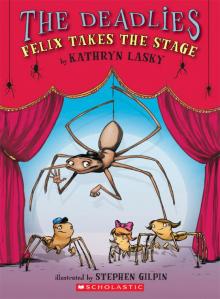 Felix Takes the Stage
Felix Takes the Stage Lucy
Lucy Lone Wolf
Lone Wolf Broken Song
Broken Song The Shattering
The Shattering The Crossing
The Crossing May
May Chasing Orion
Chasing Orion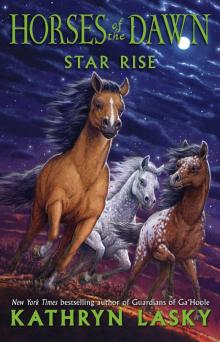 Star Rise
Star Rise The River of Wind
The River of Wind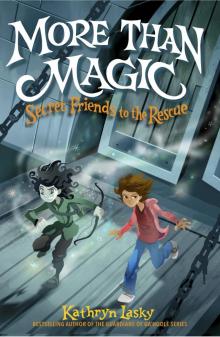 More Than Magic
More Than Magic Born to Rule
Born to Rule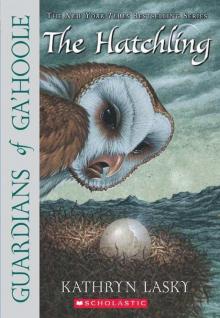 The Hatchling
The Hatchling The Rescue
The Rescue Marie Antoinette: Princess of Versailles, Austria - France, 1769
Marie Antoinette: Princess of Versailles, Austria - France, 1769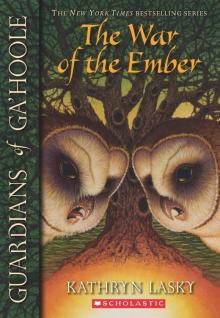 The War of the Ember
The War of the Ember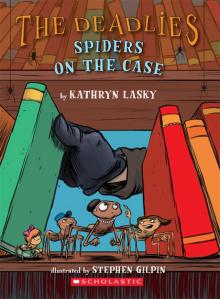 Spiders on the Case
Spiders on the Case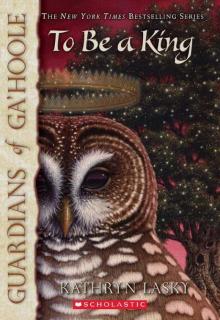 To Be a King
To Be a King The Last Girls of Pompeii
The Last Girls of Pompeii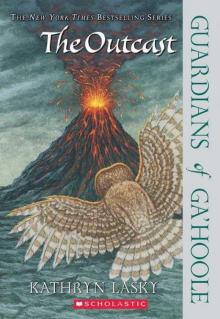 The Outcast
The Outcast Exile
Exile Night Witches
Night Witches Spirit Wolf
Spirit Wolf The Quest of the Cubs
The Quest of the Cubs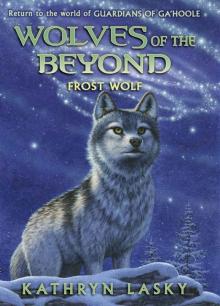 Frost Wolf
Frost Wolf The Keepers of the Keys
The Keepers of the Keys The Extra
The Extra Blood Secret
Blood Secret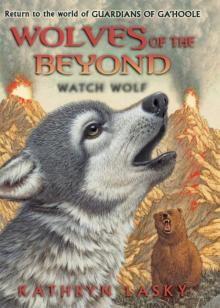 Watch Wolf
Watch Wolf Blazing West, the Journal of Augustus Pelletier, the Lewis and Clark Expedition
Blazing West, the Journal of Augustus Pelletier, the Lewis and Clark Expedition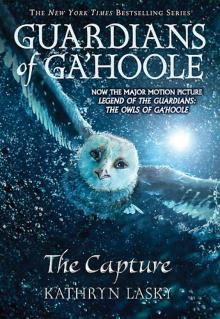 The Capture
The Capture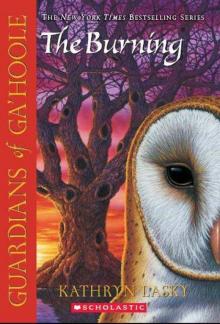 The Burning
The Burning The Journey
The Journey Unicorns? Get Real!
Unicorns? Get Real! The Escape
The Escape Star Wolf
Star Wolf Ashes
Ashes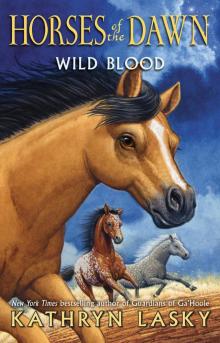 Wild Blood
Wild Blood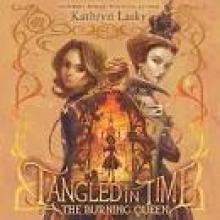 Tangled in Time 2
Tangled in Time 2 The Siege
The Siege Hannah
Hannah Elizabeth
Elizabeth A Journey to the New World
A Journey to the New World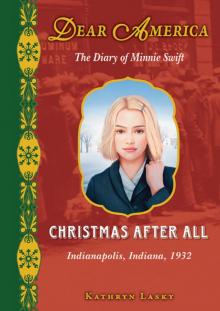 Christmas After All
Christmas After All Mary Queen of Scots
Mary Queen of Scots